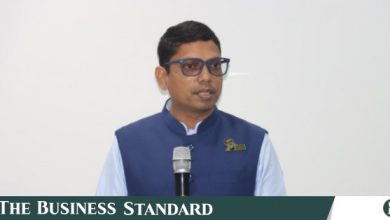4.72cr tonnes rice production by 2050 is challenging: BIDS


Continuous decline in land available for rice cultivation, and the detrimental effects of climate change are key obstacles
A file photo of Binayak Sen, director general of BIDS, speaking at a programme. Photo: Collected
“>
A file photo of Binayak Sen, director general of BIDS, speaking at a programme. Photo: Collected
Achieving a production target of 4.72 crore tonnes of rice by 2050 is unlikely thanks to several significant challenges, including climate change, experts said today at a seminar organised by the Bangladesh Institute of Development Studies (BIDS).
The seminar, titled “Leading Issues in Agricultural Development in Bangladesh,” highlighted key obstacles including a continuous decline in agricultural land available for rice cultivation, a shift from rice production to more profitable cash crops, and the detrimental effects of climate change.
In the keynote address, Shykh Seraj, senior fellow at BIDS, referenced a study titled “Rice Vision for Bangladesh: 2050 and Beyond” by the Bangladesh Rice Research Institute, which projected a rice production of 4.72 crore tonnes by 2050.
He said the target is challenging due to the shrinking of agricultural land, the shift from rice production to more profitable cash crops, and the adverse effects of climate change.
“To address this, we need to convert 44 lakh hectares of land in 15-17 coastal districts, currently used for single cropping, to support two or three crop cycles annually to boost production.”
BIDS Senior Research Fellow and Agricultural Economist Sattar Mandal said the shrinking size of agricultural land jeopardises the survival of small farmers, making the goal of producing 4.72 crore tonnes of rice by 2050 a distant prospect.
Shykh Seraj, also the director and head of news at Channel I, emphasised the need to focus on developing stress-tolerant rice varieties. “We have developed many good varieties, but we have not produced mega varieties like 28 and 29 due to weak research. Often, a variety researched five years ago becomes outdated by the time it’s released because land conditions and contexts have changed,” he said.
He also highlighted the disparity between farm-level and urban prices. “In remote areas, cabbage is bought for Tk3, but the price rises to Tk22 when transported to urban areas. There is no logical reason for this, leading to high prices for many agricultural products,” Seraj noted.
Additionally, he suggested subsidising small machines costing Tk20,000-Tk30,000 instead of large machines costing Tk23-24 lakh to reduce costs and support the commercialisation of farmers’ production systems.
Former State Minister for Planning Shamsul Alam stated, “82% of our economy is informal, with a significant portion in agriculture. Agriculture is undergoing massive change and should not be constrained to a specific format for food security. It needs flexibility, allowing farmers to decide its direction.”
Addressing the rise in market prices, he highlighted issues such as extortion on roads, transport management, and syndicates. “The government should address these issues. However, it should not control the market but play a supporting role in market management,” he said.
Binayak Sen, director general of BIDS, presided over the programme.




